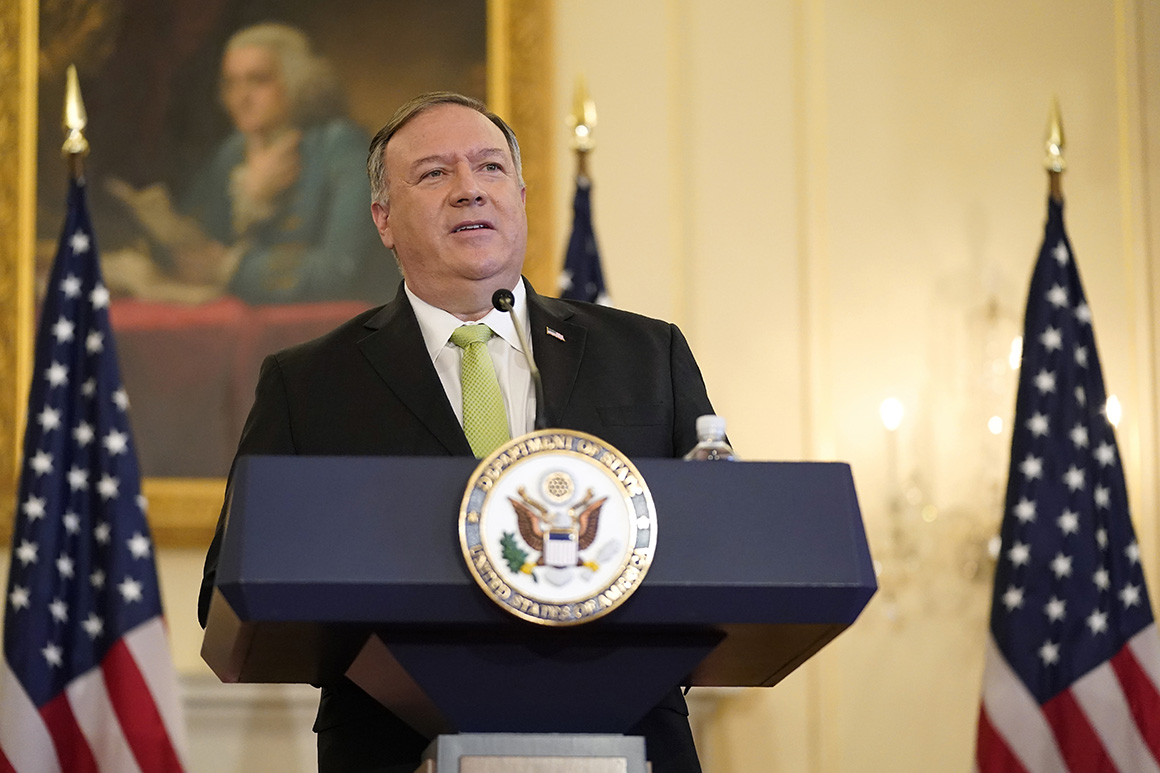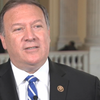A presidential election rocked by the impeachment of President Donald Trump. A little-known U.S. senator taking the reins from retiring Republican Johnny Isakson. Twin U.S. Senate contests and a sweep of competitive down-ticket races.
As 2020 dawns, Georgia faces another wild election year full of fascinating personalities and consequential debates.
Gov. Brian Kemp enters his second year in Georgia’s top job with a steep agenda – and a reputation on the line with Kelly Loeffler as his pick for the U.S. Senate. His top Democratic rival, Stacey Abrams, has positioned herself as a potential 2020 presidential running mate.
Republicans who showed a willingness to engage in partisan battles last year could hit the gas in 2020 to energize their base ahead of the election, or they could try to broaden their appeal to the center. Meanwhile, revved-up Democrats hope to consolidate their suburban gains and finally flip Georgia after a long stretch of futility.
Here are some of the biggest questions in Georgia politics that your Atlanta Journal-Constitution team will be watching this year:
(And check out our answers to questions from 2018 and 2019.)
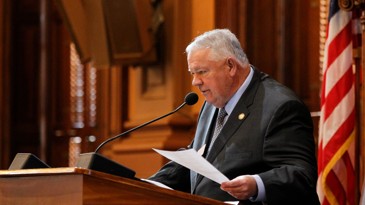
Georgia Speaker of the House David Ralston addresses the House of Representatives during the legislative session at the Georgia State Capitol in Atlanta, Georgia on Thursday, January 18, 2018. (REANN HUBER/REANN.HUBER@AJC.COM)
Photo: REANN HUBER
Will Republicans hold the Georgia House?
After carving a blue path through Atlanta’s suburbs in 2018, Democrats are closer to recapturing the Georgia House than they have been in years. The party needs to flip at least 16 seats to gain control of the chamber – a lofty, but not impossible, goal.
Democratic leaders hope to transform outrage over stiff new anti-abortion restrictions and frustration with Kemp and Trump into major gains at the ballot box. Republicans are confident that their conservative policies will keep Georgia in the GOP fold.
The battle over legislative control won’t garner as many headlines as other elections, but it could be the most consequential. It’s why both parties have pledged to spend millions of dollars in 2020 fighting over down-ticket races.
If Democrats take the chamber, they will secure a larger role in crafting policies and shaping the state budget with a GOP-controlled Senate and Republican governor. And they will have a seat at the table as lawmakers redraw Georgia’s political maps after the U.S. census in 2020.
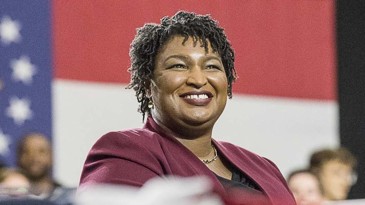
Stacey Abrams
Photo: The Atlanta Journal-Constitution
Will Stacey Abrams emerge as a vice presidential contender?
Abrams managed to raise her national profile higher than ever in 2019, turning her narrow defeat to Kemp in 2018 into a springboard to bigger things.
She drew sell-out crowds on an international book tour, courted presidential candidates and snapped a tradition of lackluster responses with her rebuttal to the State of the Union.
In between, she expanded her Fair Fight voting rights group to 19 other states, launched a group aimed at an accurate U.S. census count and started a think tank to push liberal policies across the South.
After deciding not to run for the U.S. Senate in April, she’s still made it clear she has lofty political ambitions that might go beyond a 2022 rematch against Kemp.
By year’s end, headlines bubbled up every week mentioning her as a potential running mate to top Democratic White House hopefuls, and she was seen as a certainty to be on plenty of shortlists.
Even Abrams has marveled at the heights of her political celebrity, quipping to a crowd of Vanderbilt University students last year: “I’m a really good loser.”

The Secretary of State Brad Raffensperger talks to the media in front of old voting machines while waiting for the largest shipment of Georgia’s new secure paper-ballot voting machines at the Dekalb County Voter Registration & Elections offices in Avondale Estates on Monday December 30th, 2019. 2839 units are to be delivered for Dekalb County. (Photo by Phil Skinner).
Photo: The Atlanta Journal-Constitution
How will Georgia’s rollout of new voting machines go?
Georgia enters the new year with more scrutiny than ever into its voting system following the razor-thin contest between Kemp, who as secretary of state shaped Georgia’s voting policies, and Abrams, who accused the Republican of using his position to tilt the balance in his favor.
In his first months as governor, Kemp signed a bill that replaces Georgia’s outdated voting machines, extends the time before registrations are canceled and prohibits precinct closures within 60 days of elections. But the debate infuriated critics who, among other problems, see the machines as inherently insecure.
State officials face a court-ordered deadline to get rid of the state’s 18-year-old paperless voting system before ballots are cast in 2020, and they are scrambling to set up more than 33,000 new voting machines that feature touchscreen voting with printed ballots by the March 24 presidential primary.
Pending litigation could force more changes, including a far-reaching lawsuit filed by Abrams’ voting rights group that seeks to halt voter registration cancellations, prevent ballot rejections and keep polling places open.
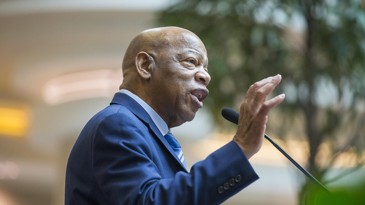
U.S. Rep. John Lewis announced Sunday that doctors have diagnosed him with stage 4 pancreatic cancer. The Atlanta Democrat is expected to stay in Washington for treatment, and he pledged to attend votes in the U.S. House when his treatment schedules permits it. (ALYSSA POINTER/ALYSSA.POINTER@AJC.COM)
Photo: The Atlanta Journal-Constitution
How will Georgia’s congressional delegation change?
Georgia’s contingent in Washington has not faced this level of potential upheaval in more than a decade.
The senior-most Republican in Georgia’s House delegation, Tom Graves, abruptly announced his retirement in early December. The senior-most Democrat in Georgia’s House delegation, John Lewis, revealed he had late-stage pancreatic cancer a few weeks later.
An unpredictable free-for-all formed in the race to replace another retiring Republican, U.S. Rep. Rob Woodall, in a Gwinnett County-based district that’s become one of the most competitive in the nation.
And Democratic U.S. Rep. Lucy McBath faces a 2020 rematch against Republican Karen Handel after she flipped the seat straddling Atlanta’s northern suburbs in 2018.
There’s also a distinct possibility of another vacancy as U.S. Rep. Doug Collins flirts with a Senate run against Loeffler, possibly with the support of the White House.
The Senate delegation is in just as much flux.
Isakson’s decision to retire because of mounting health issues ended his 45-year career in politics and left Georgia without one of the state’s most seasoned and respected lawmakers. His successor, Loeffler, is a financial executive who is little-known even to top Republican officials.
And U.S. Sen. David Perdue faces his own challenges as he runs for what he’s said is his final term. At least four well-known Democrats have lined up to face the former Fortune 500 executive.
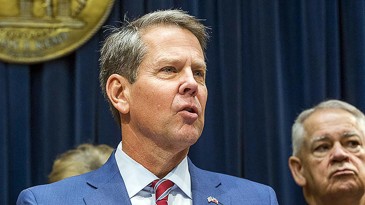
Georgia Gov. Brian Kemp said in a written statement Thursday that improved transparency will result from a rule proposed by the state agency responsible for oversight of assisted living and personal care homes.
Photo: Alyssa Pointer/alyssa.pointer@ajc.com
How will Gov. Brian Kemp handle his second year in office?
The first lifelong Republican elected as Georgia governor since Reconstruction, Kemp spent his first year in the office pursuing a range of policies his predecessors avoided.
He signed anti-abortion restrictions that triggered threats of a Hollywood boycott and backed a health care overhaul that would add tens of thousands of low-income Georgians to the Medicaid rolls but stops short of the full expansion sought by Democrats and some Republicans.
And he forced tough fiscal negotiations with a call for budget cuts of 4% and 6% over the next two years that could lead to hundreds of unfilled positions and a reduction in services.
He’ll begin 2020 with a call for tougher crackdowns on violent criminals and gang activity, veering from the eight-year effort by his predecessor, Nathan Deal, to overhaul the criminal justice system by reducing penalties for low-level offenders.
The governor will also have new chances for high-profile appointments after surprising even his critics with a drove of selections to top political and judicial posts that culminated with his selection of Loeffler to the U.S. Senate seat.
And he’ll be under pressure from conservatives who fueled his victory to fulfill his campaign promises to crack down on illegal immigration, expand gun rights and adopt a “religious liberty” proposal in an election year.
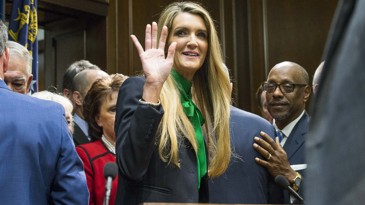
12/04/2019 — Atlanta, Georgia — Newly appointed U.S. Senator Kelly Loeffler waves toward supporters following a press conference in the Governor’s office at the Georgia State Capitol Building, Wednesday, December 4, 2019. Georgia Gov. Brian Kemp appointed Kelly Loeffler to the U.S. Senate to take the place of U.S. Senator Johnny Isakson, who is stepping down for health reasons. (ALYSSA POINTER/ALYSSA.POINTER@AJC.COM)
Photo: Alyssa Pointer/alyssa.pointer@ajc.com
How will Kelly Loeffler perform in the U.S. Senate?
When Loeffler applied for the open U.S. Senate seat in November, there was an immediate stir from her fellow Republicans: Who is this financial executive, and what did she stand for?
A wave of apprehension from conservative activists followed as her critics pored through her financial records, raised concerns about potential ethical issues over her corporate ties and questioned whether she was a closet moderate.
The governor’s decision to tap her for the seat defied Trump’s pleas for Kemp to appoint Collins or another politically tested conservative to the post. Loeffler’s tried to calm those fears with promises to back Trump’s agenda and reach out to grassroots activists.
Still, her appointment has sparked rifts within the Georgia GOP that will be hard to heal. Many local Republican leaders have pointedly not offered her an endorsement, instead taking a wait-and-see approach to how she handles her first months on the job.
And as she prepares to take office in early January, she faces the possibility of a challenge from Collins or another GOP rival, even as Democrats try to unite behind their own contender – whoever that may be — for the November special election.

ATLANTA, GEORGIA – NOVEMBER 20: Democratic presidential candidates Sen. Cory Booker (D-NJ), Rep. Tulsi Gabbard (D-HI) , Sen. Amy Klobuchar (D-MN), South Bend, Indiana Mayor Pete Buttigieg, Sen. Elizabeth Warren (D-MA), Former Vice President Joe Biden, Sen. Bernie Sanders (I-VT), Sen. Kamala Harris (D-CA), Andrew Yang, and Tom Steyer participate in the fifth Democratic Presidential Debate at Tyler Perry Studios November 20, 2019 in Atlanta, Georgia. Ten Democratic presidential hopefuls were chosen from the larger field of candidates to participate in the debate hosted by MSNBC and The Washington Post. (Photo by Alex Wong/Getty Images)
Photo: Alex Wong/Getty Images
Can Democrats flip Georgia and win its two U.S. Senate seats?
Not since Bill Clinton’s 1992 victory has a Democratic presidential candidate carried the state. And no Democrat has won a statewide contest in Georgia since 2006.
Just about every cycle since then, the same question has been asked: “Is this the election that turns Georgia into a battleground state?”
The answer was clear in years gone by, when national Democrats largely avoided Georgia and state candidates steered clear of national figures. But the tight 2018 election offered a different lesson, one that even top Republicans dubbed a “wake-up call” for their party.
Democratic White House hopefuls swarmed the state with Georgia-centric appeals and lavished praise on Abrams, who warned it would be “political malpractice” to ignore the state. And local Democrats seized the chance to use November’s presidential candidates debate in Georgia as a chance to showcase the party’s 2020 strategy.
Still, the Georgia GOP opens the year with huge advantages. Top Republican candidates have built lofty campaign accounts, hold all the levers of power in Georgia and will look to turn the Democratic-led impeachment of Trump into a campaign battle cry.
Meanwhile, Democrats end the year with no clear front-runners in either Senate contest after Abrams and other prominent leaders passed on the chance to run. And many top party figures have yet to pick a side in the presidential race as concerns grow about a drawn-out battle for the nomination.
Support real journalism. Support local journalism. Subscribe to The Atlanta Journal-Constitution today. See offers.
Your subscription to the Atlanta Journal-Constitution funds in-depth reporting and investigations that keep you informed. Thank you for supporting real journalism.
